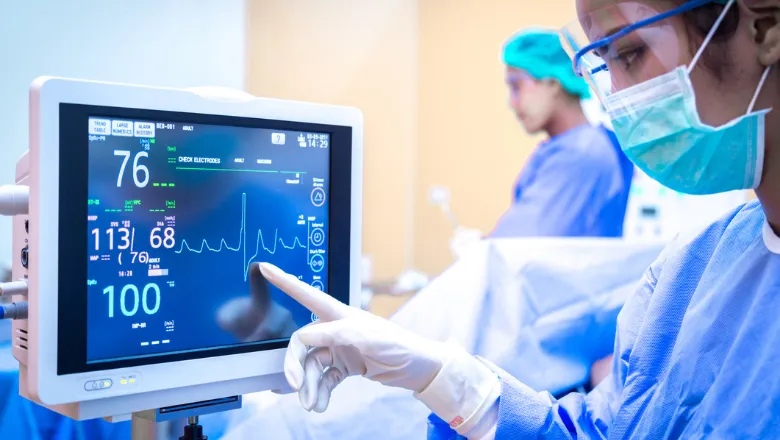We have conducted the largest study to date evaluating the accuracy of NEWS2 for predicting medium-term COVID outcomes. NEWS2 is widely used in UK NHS trusts but little is known about how well it can predict severe COVID outcomes and so evaluating its accuracy is important as we look to improve patient care now and in future.
Dr Ewan Carr, Statistician Research Fellow at the Institute of Psychiatry, Psychology & Neuroscience (IoPPN), King’s College London, and co-lead author
21 January 2021
NEWS2 evaluated for prediction of severe COVID-19 outcome in large international study
In the first systematic large-scale evaluation of the UK National Early Warning Risk Score (NEWS) 2 as a scoring system for predicting severe COVID-19 outcomes in patients, researchers at King’s College London have found poor-to-moderate accuracy for identifying patients at risk of being transferred to intensive care units (ICUs) or dying after 14 days of hospitalisation. Accuracy of predictions in short-term (three days) showed moderate success.

For people who are hospitalised with severe COVID-19, it is vital to quickly identify which patients may deteriorate and require transfer to an intensive care unit (ICU) for organ support or may die. NEWS2 is an early warning score that combines physiological parameters such as respiration rate, oxygen saturation, blood pressure and temperature. NEWS2 is currently used almost universally in UK NHS Trusts to identify which patients are at risk of deteriorating early.
The paper was published today (Thursday 21 January) in BMC Medicine.
Accuracy of NEWS2
Researchers analysed data from 1,276 COVID-19 patients admitted to King’s College Hospital NHS Foundation Trust during the first wave in March-April 2020. The team then validated their models using data for over 6,000 patients across eight other hospitals globally (five in the UK, one in Norway, and two in China). At all UK sites, around one third of patients with COVID-19 were transferred to ICU or died within 14 days of hospital admission.
The researchers evaluated how well patients’ NEWS2 scores measured at hospital admission anticipated who would have severe COVID-19 outcomes, which means either being transferred to ICU or dying. In all UK sites, combining NEWS2 and age to predict outcomes showed moderate success in the short-term (three days), but for poor-to-moderate success for medium-term (14 days) outcomes.
He added, “By collecting data from nine hospitals globally, our results have robust external validation. We found consistency across sites both in the performance of NEWS2 alone, as well as for the supplemented model. In short, NEWS2 tended to have poor-moderate performance but was improved by adding common blood and physiological measures.”
The research team used CogStack, an existing platform developed by NIHR Maudsley BRC and in use at King’s College Hospital NHS Foundation Trust, which allows for rapid extraction and processing of data from patient’s electronic health records.
The CogStack platform allows us to extract information from deep within hospital records at King's College Hospital NHS Foundation Trust in real time in order really explore complex questions such as this. This includes being able to extract information relating to co-morbidities, for example, that may only be mentioned in passing in the physician narrative.
Professor Richard Dobson, Head of the Department of Biostatistics & Health Informatics, NIHR Maudsley BRC
Improving predictive ability
Researchers found that accuracy in predicting severe outcomes was improved by considering routinely-collected blood and physiological parameters from patients including age, oxygen saturation and neutrophil count, which is an important infection-fighting immune system cell. In models that supplemented NEWS2 with these parameters the ability to predict severe outcomes was improved.
Our results for the first time validates NEWS2, and shows how it could be improved by adding common blood and physiological parameters. Thankfully, this NHS scoring system is easy to adapt and implement in real-world clinical practice, compared to other complex risk-scoring models.
Dr James Teo, Consultant Neurologist at King’s College Hospital and Clinical Director of Data Science and lead of CogStack platform
He continued, “I, alongside all the authors and collaborators, would like to thank the guidance and contributions of the patients and members of the King’s Electronic Records Research Interface that made this all possible.”
The study was a collaboration between the National Institute for Health Research (NIHR) Maudsley Biomedical Research Centre (BRC), UK Health Data Research Alliance (HDR UK) and the Medical Research Council (MRC).
Contact
To find out more or to arrange interviews, please contact the Communications team at NIHR Maudsley BRC:
- Alex Booth, Communications and Engagement Manager, NIHR Maudsley Biomedical Research Centre, Tel 020 7848 0495 alex.booth@kcl.ac.uk
- Serena Rianjongdee, Communications and Engagement Officer, NIHR Maudsley Biomedical Research Centre, Tel 020 7848 2137 serena.rianjongdee@kcl.ac.uk


